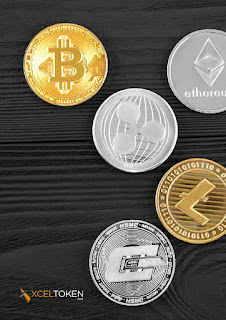Benefits of Blockchain Technology and Cryptocurrency
To
understand the benefits of the Blockchain Technology and Cryptocurrencies its important for us to
understand what they are, This Article aims to provide you with all the
information that you need to understand each of these are.
Understanding
Blockchain
A Blockchain is, in the
simplest of terms, a time-stamped sequences of unassailable record of information
that is managed by cluster of computers not owned by any single entity. Each of
these blocks of data (i.e. block) are protected and bound to each other by
means of cryptographic values (i.e. chain).
The blockchain network
has no central authority — it is the very definition of a democratized system.
Since it is a shared and unassailable ledger, the data in it is open for anyone
and everyone to see. Hence, anything that is constructed on the blockchain is
by its very nature transparent and everyone involved is responsible for their
actions.
Benefits
of The Blockchain Technology
Blockchain
is taking the world by storm and for good reason! There are plenty of benefits
that come with using the technology in place of other current systems. Some of
the major benefits that are connected with blockchain consist of the permanence
and safety of the data that is stored on the blockchain’s ledger, the continentality
and privacy maintained by users of a network with blockchain technology, the
lack of a “middle man” due to the peer-to-peer nature of blockchain, the
freedom provided by decentralization, the security that comes with distributing
the blockchain across all users of the network, and the lower transaction fees
that stem from using the efficient technology. Generally, it is quite simple to
see why blockchain has managed to become so popular.
Here
are some key benefits:
Understanding
Cryptocurrency
A cryptocurrency
is a digital currency that is created and managed through the use of advanced
encryption techniques known as cryptography. Cryptocurrency made the leap from
being an academic concept to (virtual) reality with the creation of Bitcoin in
2009. While Bitcoin attracted a growing following in subsequent years, it
captured significant investor and media attention in April 2013 when it peaked
at a record $266 per bitcoin after surging 10-fold in the preceding two months.
Bitcoin sported a market value of over $2 billion at its peak, but a 50% plunge
shortly thereafter sparked a raging debate about the future of cryptocurrencies
in general and Bitcoin in particular.
Benefits
of Cryptocurrency
· Fraud: Cryptocurrencies are
digital and cannot be copied or upturned randomly by the sender, as
with credit card charge-backs.
· Identity Theft: When you
give your credit card to a merchant, you give him or her admission to your full
credit line, even if the transaction is for a small amount. Cryptocurrency use
a “push” machinery that allows the cryptocurrency
holder to send precisely what he or she wants to the merchant or recipient with
no additional information.
· Immediate Settlement: Acquiring
real property characteristically involves a number of third parties (Lawyers,
Notary), delays, and payment of fees. In many ways, the bitcoin/cryptocurrency
blockchain is like a “large property rights database,” says Gallippi. Bitcoin contracts
can be designed and prescribed to eradicate or add third party approvals,
reference external facts, or be completed at a forthcoming date or time for a portion
of the expense and time required to complete traditional asset transfers.
· Access to
Everyone: There are
approximately 2.2 billion individuals with access to the Internet or mobile
phones who don’t presently have access to traditional exchange systems. These
individuals are primed for the Cryptocurrency market.
· Lower Fees: There
aren’t usually transaction fees for cryptocurrency exchanges because the miners
are compensated by the network (Side note: This is the case for now). Even
though there’s no bitcoin/cryptocurrency transaction fee, many expect that most
users will engage a third-party service, such as Coinbase, making and
maintaining their own bitcoin wallets. These services act like Paypal does for cash or credit
card users, providing the online exchange system for bitcoin, and as such,
they’re likely to charge fees. It’s interesting to note that Paypal does not agree to take or
transfer bitcoins.
Now that you have a fair understanding of what blockchain
and cryptocurrency are and their benefits, get your hands on some XcelToken Plus and start trading it on one
of the 14 exchanges that it is listed on!




Comments
Post a Comment